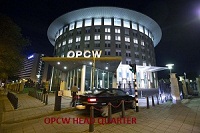NOBEL PEACE PRIZE 2013
The Nobel Peace Prize 2013 was awarded to Organisation for the Prohibition of Chemical Weapons "for its extensive efforts to eliminate chemical weapons".

This Year Nobel peace Prize is given to OPCW or The Organization for the prohibition of Chemical Weapons. The prize money is $1.2 million which was awarded to OPCW "for its extensive efforts to eliminate chemical weapons”. There are 259 candidates for the Nobel Peace Prize for 2013 and among them 50 of these are organizations; 259 is the highest number of candidates ever. The previous record was 241 from 2011. Last year the Nobel Peace Prize was awarded to European Union (EU) "for over six decades contributed to the advancement of peace and reconciliation, democracy and human rights in Europe".
Some of the nominees are much highlighted as like Malala Yousafzai a Pakistani activist who was shot by Taliban Militants, Denis Mukwege a doctor in the Democratic Republic of Congo, who has treated thousands of women gang-raped and tortured during the civil war, Lyudmila Alexeyeva, Svetlana Gannushkina and Lilya Shibanova and some are most controversial as like Vladimir Putin and Edward Snowden etc.
 However the prize won by OPCW for its contribution to eliminate use of chemical weapons which is approved by Geneva Convention of 1925. But as per Geneva Convention 1925 use of chemical weapons is prohibited but not of its storage or production. During World War Two, chemical means were employed in Hitler’s mass exterminations. Chemical weapons have subsequently been put to use on numerous occasions by both states and terrorists. In 1992-93 a convention was drawn up prohibiting also the production and storage of such weapons. It came into force in 1997. Since then the OPCW has, through inspections, destruction and by other means, sought the implementation of the convention. 189 states have acceded to the convention to date.
However the prize won by OPCW for its contribution to eliminate use of chemical weapons which is approved by Geneva Convention of 1925. But as per Geneva Convention 1925 use of chemical weapons is prohibited but not of its storage or production. During World War Two, chemical means were employed in Hitler’s mass exterminations. Chemical weapons have subsequently been put to use on numerous occasions by both states and terrorists. In 1992-93 a convention was drawn up prohibiting also the production and storage of such weapons. It came into force in 1997. Since then the OPCW has, through inspections, destruction and by other means, sought the implementation of the convention. 189 states have acceded to the convention to date.
The conventions and the work of the OPCW have defined the use of chemical weapons as a taboo under international law. Recent events in Syria, where chemical weapons have again been put to use, have underlined the need to enhance the efforts to do away with such weapons. Some states are still not members of the OPCW.
The Norwegian Nobel Committee has through numerous prizes underlined the need to do away with nuclear weapons. By means of the present award to the OPCW, the Committee is seeking to contribute to the elimination of chemical weapons.
Sources:
1. http://www.telegraph.co.uk/news/worldnews/10367694/Nobel-Peace-Prize-2013-the-nominees.html
2.http://nobelpeaceprize.org/en_GB/nomination_committee/nominations-2013/










